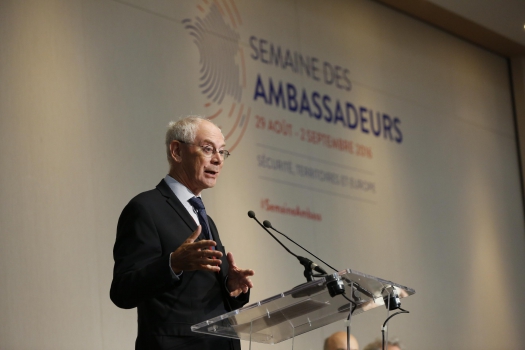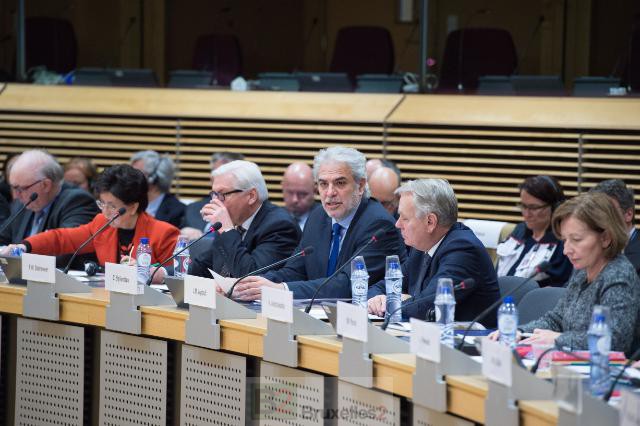Herman's Spikes and Thoughts

(BRUSSELS2 to Paris) Former President of the European Council Herman Van Rompuy was out on Thursday (1 September). He spoke to the French ambassadors, gathered for their traditional back-to-school seminar (the week of ambassadors) in Paris.
With his tasty tone, pecking here and there, with a sarcastic humor, Herman delivered his point of view and his experience. We may not share all his remarks, his spades, his analyses. But we must listen to them because they nourish the profile of the one who now wants to be a "wise man" of Europe. He also outlines what his future role could be: chairing a group of wise men to reflect on the future. In his mind, it is necessary to put an end to the diagrams of intellectual construction and too institutional reflections to move on to the concrete: to strengthen the European projects (Euro, Schengen, internal market) which all suffer from a certain deficiency: not having been designed for the crisis. It also highlights the need to deepen the military dimension of the European Union.
NB: These remarks are selected. But they reflect the main points of the speech of the former President of the European Council. Some elements have been grouped together to facilitate understanding of the themes.
The Euro, Schengen, were not made to face crises
“We created with the Schengen zone, the Euro zone as political projects. But the logistics were lacking. They weren't set up for big crises. The Euro zone was not designed to deal with the worst economic crisis we have known since the crisis of the 1930s. The Schengen zone was not created to deal with the biggest refugee crisis in years ...
No need for a major institutional debate
“(Today) We don't need a big institutional debate. (...) We do not need a fundamental reorientation, we need a revitalization of Europe. We must resume the strategic orientations on which we agreed in June 2014 in Ypres. (...) We must structure the economic and financial policy... have a real banking union, an economic union, a budgetary union, a capital union. We have taken steps this year, we must continue. (...) We must deepen our common market, our economic and financial market, (...) create a digital Europe, a common research area... (...) deepen our military dimension... "
London already absent from European policies, even in terms of foreign policy...
“Of course, there is Brexit, it is an endogenous crisis. But the United Kingdom is already not a full member. The United Kingdom was not a member of Schengen, of the Euro Zone. He has social opt-outs, in the police, in the justice system. Even in foreign policy, (the United Kingdom) was no longer active. In Minsk (NB: to resolve the Ukrainian conflict), there was Hollande, Merkel, not the British Prime Minister...”
Public opinion and Brexit
“Our opinion is not obsessed with Brexit. She is more concerned with unemployment, economic issues, security, terrorism. It is a theme, a political amputation for the Union. But this is only one theme among others. »
No additional risk of implosion
“There is no risk of implosion, of other exits that one could imagine. It is clear that there is no additional risk. It is no coincidence that confidence (in the European institutions – we cannot speak of enthusiasm – rose after June 23 (date of the British referendum)...”
Create a new dream, well, above all it takes leadership
"You don't need a new dream. Often when we don't have the idea, we say 'we need a new narrative'. But we need a new ambition, a Europe of results. (...) We need a positive discourse on Europe, that our leaders show their leadership, sometimes against public opinion. He turn fear into hope not only at European level but also in the Member States...”
Complexity is beautiful
“I come from a country that is complex. (...) Complexity is not automatically a handicap. Simplicity does not automatically facilitate decision-making. The United States is a simple country with a congress, a president but there has been a blockage for 4 years. (...) We can make it simple, we can merge the presidency of the European Council and the Commission. This idea is sometimes present among European federalists. (But) imagine that it is the President of the Council who becomes the President of the Commission, and not the other way around. Will we have solved a problem? No. We will have imported a conflict..."
The scapegoat of institutions
“It lacks a will to go forward, a state of mind. When there is not this will, we make up for it on institutions.... »
A group of wise men to reflect on the future generation
“Now is not the time to launch new initiatives. But an intellectual effort is not superfluous. Entrusting some people with the task of reflecting on what could be changed, simplified, energized, made more efficient, not for today but in 5 or 10 years, that would be a “wise” initiative. The European process is an ongoing process. It will be ripe for the next generation in 5-10-15 years. Let's entrust it to some who have no immediate responsibility as we did in Laeken..."
(Comments collected by Nicolas Gros-Verheyde)


